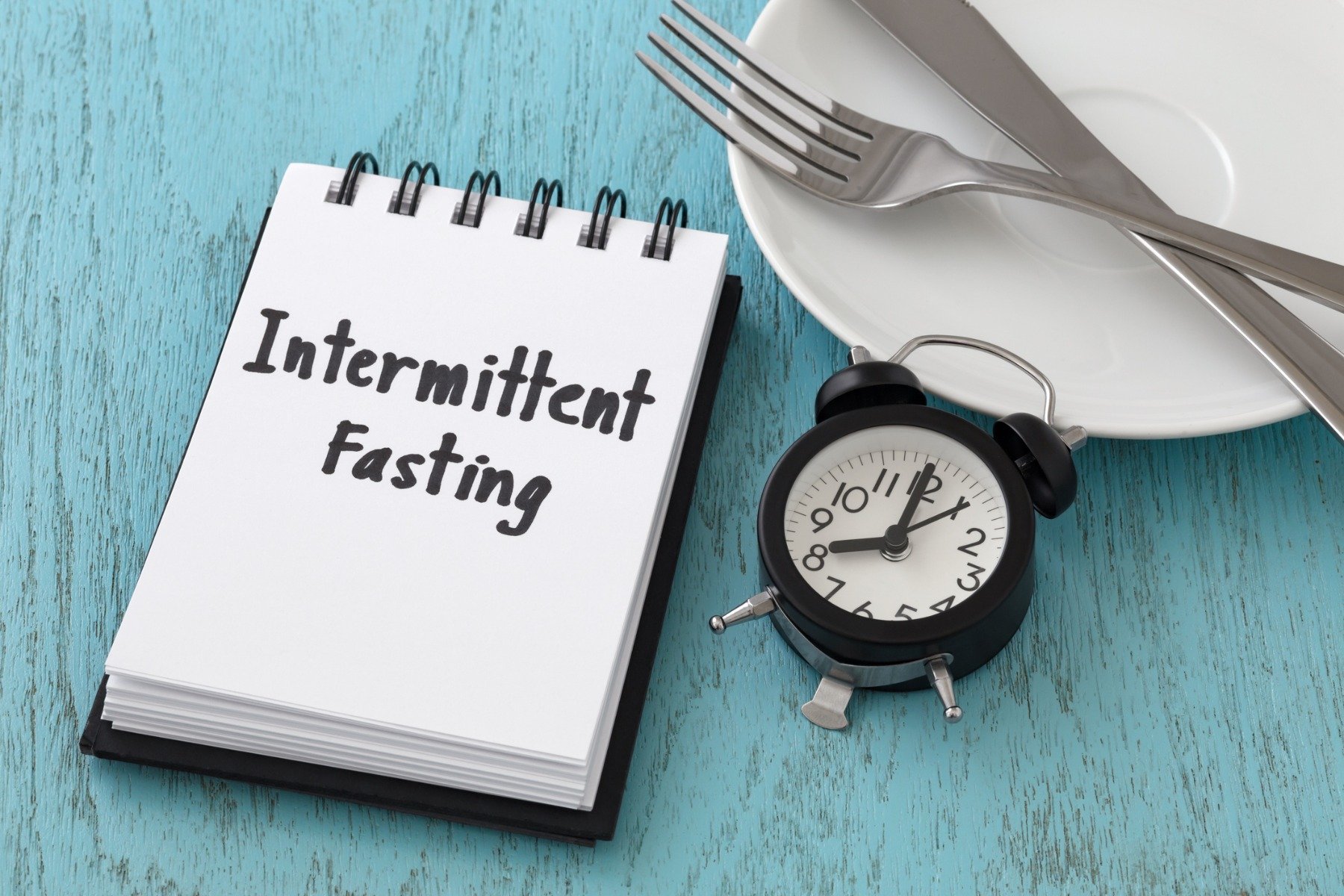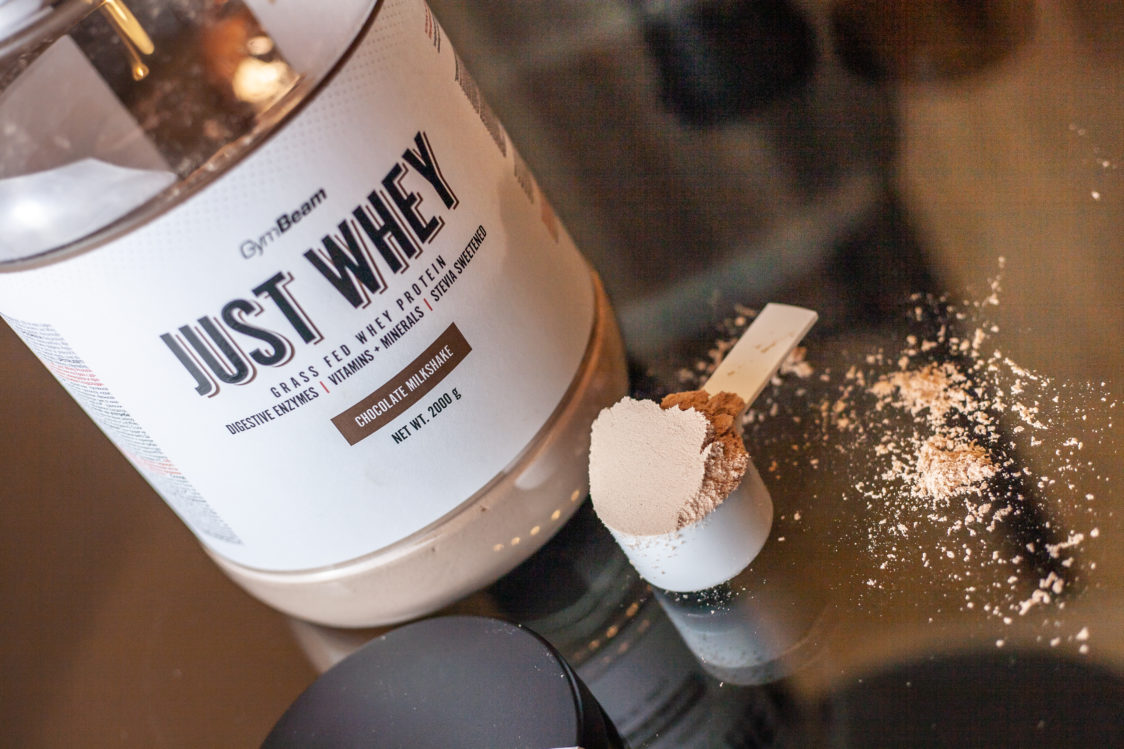Table of Contents
The intermittent fasting has long enjoyed popularity in the fitness community. That’s why we decided to bring you information about what intermittent fasting is, what types of IF we know, and what health benefits you can expect from this diet. Finally, we will also tell you how to combine an intermittent fasting with training and advise you on choosing nutritional supplements. Do you dare to intermittent fasting too?
What is an intermittent fasting?
Intermittent Fasting – IF – is a way of time-limited diet. That is, the period of deliberate limitation of calories (up to 25% of normal daily calorie intake) for 16 to 24 hours, alternates with the time of relatively normal intake, for 8 to 24 hours, depending on the type of IF. [35] Unlike other diets, you can eat almost everything during an intermittent fasting, but only in limited time.
The basic idea of intermittent fasting is to reduce the amount of calories received, resulting in weight and fat loss. It’s just one way to get a figure of your dreams and get rid of your belly. It is a simple way of eating that is popular with many people. The advantage of intermittent fasting is the fact that research confirms its health effects.

Types of intermittent fasting
Intermittent fasting types vary based on the time range in which you do not eat. On the following lines we will introduce you 6 types of intermittent fasting. Each of them can be effective for you. However, which type of IF will fit you is very individual.
1. 16/8 – 16-hour intermittent fasting
It is the most natural way of fasting. 16/8 is a method of fasting every day for 16 hours, and eating two, three and more meals for the remaining 8 hours of the day. This intermittent fasting is also known as the Leangains protocol and has been popularized by fitness expert Martin Berkhan. [9]
Being on a 16/8 diet in practice means you cut out breakfast and your last meal will be dinner. For example, you stop eating at 20:00 in the evening and your next meal will be lunch at 12:00 the following day. You won’t even notice that you’ve handled a 16-hour intermittent fasting, including an 8-hour sleep.
You can adjust it to your own needs. If you can’t imagine the beginning of the day without a good breakfast, you can cut out dinner. It is important to keep the 14/10 or 16/8 ratio.
Of course, in times of hunger, you need to take enough fluids to hydrate your body. However, you can enjoy only water, unsweetened coffee and calorie-free drinks. During the eating window, you can normally eat what you have regularly eaten so far. For faster results, add more vegetables, fruits and healthy foods to your diet. Indeed, even an intermittent fasting will not do miracles if you get stuffed in eight hours, as if you wanted to catch up 16 hours of fasting. The golden rule still applies, just eat as much as you will be able to burn during the day.

2. The Warrior Diet
The warrior diet, designed by Orim Hofmekler, is another type of intermittent fasting of 20/4. You are on an intermittent fasting for 20 hours, while you can eat 4 hours a day. The aim of the warrior diet is to increase the effect of the sympathetic nervous system, which helps to stimulate lipolysis and accelerate metabolism. [44] On the contrary, during the 4-hour eating window, you activate the parasympathetic nervous system, which helps to increase glucose uptake and regeneration. [45]
You can find Warrior’s diet and 16/8 mode clearly arranged on the timeline. [5]
3. 5:2 – intermittent fasting for 2 days a week
The 5:2 intermittent fasting consists of five days of normal eating and two days with 500 to 600 calories a day, while 600 calories can be eaten by men and 500 by women. The 5:2 mode is also known as “fast diet”, which has been pushed into the media by a doctor and journalist, Michael Mosley. In practice, eating 5: 2 looks like eating classic portions throughout the week, reducing calorie intake on Tuesdays and Thursdays. Thus, you will only eat two smaller doses with a calorie content of 250 for women and 300 for men. Critics see the disadvantage of this diet and that it has not been sufficiently researched, although the intermittent fasting has been subject of many studies. [9] [5]
4. Eat-stop-eat – all-day intermttent fasting once or twice a week
Eat-stop-eat includes 24-hour fasting at least once or twice a week. This type of intermittent fasting has been very popular over the past few years thanks to Brad Pilon, a fitness expert.
The eat-stop-eat mode is about not eating from the first day’s dinner until the second day’s dinner. Of course, you can also do intermittent fasting from breakfast to breakfast, or from lunch to lunch the next day. The goal is to stay 24 hours without food. Coffee, water and other calm drinks are allowed to help you avoid hunger. If you want to lose weight, it is important that you eat as much as if you were on a diet on days when you are not on an intermittent fasting. But beware, we still talk about receiving a healthy and balanced diet.
If you plan to try this diet, we recommend that you first test your fasting for 14 to 16 hours and gradually prepare your body for a day of hunger. If you do this, your eating schedule will look similar to the picture below. [9] [5]

5. Alternate-day fasting – every other day
Alternate-day fasting is a way of fasting every other day. There are several versions of this type of intermittent fasting. From full fasting to the ability to take 500 calories during an intermittent fasting.
For example, for 12 hours you are eating us usually and for the next 36 hours you are fasting, or you can eat for 24 hours, and then you are on an intermittent fasting for another 24 hours. [5] Alternate-day, however, is a very extreme type of intermittent fasting, so you should not keep it long. A breakdown of meals based on this method can be found in the picture. [9]

6. Random Meal Skipping – occasional fasting
You do not always need to follow strict instructions for an intermittent fasting. If you try 24-hour fasting once in a while, it can bring you some health benefits of an intermittent fasting. It’s just a myth that people have to eat every few hours in order not to get into hunger and not lose muscle mass. The human body is adapted to last a few days without food. Therefore, try this diet at a time when you don’t feel hungry, when you are traveling, or you have no time to cook. How does it look like in practice? See the illustrative eating schedule during the occasional intermittent fasting in the attached picture. [5] [9]

You might be interested in these products:
5 health benefits of intermittent fasting
Different types of intermittent fasting bring similar benefits. These include weight reduction, cholesterol lowering, or blood sugar control. We will present you all the effects of IF on the health and the human body step by step.
Note that intermittent fasting is among the relatively new ways of eating, so research is still underway to test its effect on health or longevity.

1. IF contributes to the proper heart function
Most heart diseases are a way of your body to respond to bad eating habits, high cholesterol or blood pressure. Adhering to alternate-day fasting for 8 weeks helped the test group to lower LDL cholesterol and triglyceride levels in the blood by 25% to 32%. [19]
A study of 110 obese adults confirmed that fasting for 3 weeks reduces blood pressure, triglyceride levels, and LDL cholesterol. [20] In addition, research on 4,629 people who have been applying IF showed results that fasting is reducing the risk of coronary heart disease and diabetes. The combination of these benefits contributes to a better health of the heart. [21]
2. IF effectively reduces weight and fat
Yes, IF really works to reduce weight. [5] everal studies have confirmed this. [2] However, the results are variable and depend on various factors. For example, skipping breakfast led to weight loss in one study [3], but in another, this effect was not confirmed. [4] But the difference could be because in both studies the controlled group received a standard breakfast, but nobody checked the diet during the day. Some research suggests that, in addition to increased weight and fat reduction, intermittent fasting can trigger metabolism. This is due to an increase in noradrenaline levels. [22] The fact remains that one-day fasting can reduce weight by 9% and significantly reduce body fat over 12 to 24 weeks. [23]

A study comparing the intermittent fasting with calorie restraint agreed with that. The results confirmed that intermittent fasting can reduce weight and body fat from 8 to 16%, a comparable result to calorie limitation. In addition, however, experts have found that intermittent fasting is a more effective way of reducing fat because it retains muscle mass. [24]
3. IF regulates blood sugar and reduces insulin resistance
Research in Type 2 diabetics has shown that short-term fasting can significantly reduce their blood sugar levels. [13] At the same time, one study confirmed the effects of calorie intake restriction in the form of intermittent fasting 16/8 and alternate-day fasting to reduce insulin resistance.. [14]
Reducing insulin resistance can increase the sensitivity of the body to insulin, allowing it to transport glucose more efficiently from the bloodstream to the cells. Along with lowering blood sugar levels, the body can regulate sugar levels during fasting and effectively combat its rise and fall. [12]
It looks promising, but since this trend is very young, it needs to be explored in more detail. One short study tested the effect of alternate-day fasting with result that the alternate-day fasting negatively affected blood sugar levels in women, while there was no effect in men. [15] Therefore, if you have diabetes and want to try intermittent fasting, consult it with your doctor first.
4. IF increases growth hormone production
Growth hormone is a type of protein that is an essential element for growth, metabolism, weight reduction, and strength building. [26] [27] [28] [29]
Several studies have confirmed that intermittent fasting can naturally increase growth hormone levels. One of them found that growth hormone levels increased significantly after 24 hours of fasting. [30] Another study suggests that a two-day fast can lead to a 5-fold increase in the production of this hormone. [31]
We also mentioned that intermittent fasting regulates sugar and insulin levels during the day, which can also positively affect growth hormone. This is also evidenced by the finding that higher insulin levels may lower growth hormone levels. [25]
5. IF supports health in the fight agains inflammation
One study in 50 healthy adults has shown that intermittent fasting for one month alleviates inflammatory factors. [16] Another study confirmed this effect in people who fasted 12 hours a day for 30 days. [18]
Animal studies have also been promising. After a low-calorie diet, very similar to intermittent fasting, experts found lower levels of inflammatory markers. At the same time, this diet was beneficial in the treatment of multiple sclerosis or chronic inflammation. [17] This effect of intermittent fasting has not yet been demonstrated in humans, but is an object of interest for scientists and supporters of IF.

Intermittent fasting and longevity
Experts are also discussing whether an intermittent fasting can have a beneficial effect on alleviating the signs of old age, and thus bring people a long life. We can partially interpret these benefits in the effects of intermittent fasting on LDL cholesterol decline or blood sugar regulation.
Statements claiming intermittent fasting is linked with longevity have so far been proven only in animals. [32] Before we start to rejoice in this benefit, we need to get the same result in a human study. However, similar research has not been done yet.
Researchers are also trying to assess the potential metabolic benefit of intermittent fasting. They consider that intermittent fasting could provide unique metabolic benefits [1],as well as have a positive impact on mood enhancement. [8] Research that would confirm the hypotheses has not been carried out yet.
Intermittent fasting for athletes
Even athletes have succumbed to the intermittent fasting diet because they do not have to change their training regime and it is not demanding on eating. Study participants who held alternate-day fasting confirmed that they were less hungry, more satisfied, and compared to other diets, did not tend to cheat themselves about food. [33]

However, IF can increase the feeling of fatigue for athletes, especially during training with empty stomach. However, this does not mean that they are performing less. Nevertheless, it is advisable to use supplements to support regeneration and immunity when holding intermittent fasting.
Supplements suitable during intermittent fasting
Here’s a list of recommended nutritional supplements to maximize your efforts during the intermittent fasting diet. They are categorized into supplements during the day, before, during and after training.
1. Nutritional supplements throughout the day Branched Chain Amino Acids
BCAA supplementation helps you increase protein synthesis, which aligns some of the cleaved proteins. You will appreciate this benefit if you train with an empty stomach while being fasting. [34]
2. Before a workout
- Caffeine – Caffeine replenishment gives you the necessary amount of energy. At 2 – 5 mg dose per 1 kg of your weight, it can also significantly increase the upper body strength. [36]
- Beta-alanine – Beta-alanine supplementation has been found to promote performance as it prevents fatigue. This nutritional supplement enhances the amount of carnosine intracellular buffer that reduces the level of acidity in the blood, which results in better performance. The effective dose of beta-alanine is from 3.2 g to 6.4 g per day. [37]
- Essential Amino Acids and Carbohydrates – Consuming 6 grams of essential amino acids in a mixture of 35 grams of sucrose immediately prior to training significantly increases protein synthesis. This is due to the influx of amino acids to the active muscles [38]
3. During a workout
BCAA – Adding branched-chain amino acids during training benefits in two ways. BCAAs prevent the breakdown of proteins while helping to regenerate muscles while preventing overall fatigue. The recommended dose is at least 7 g of BCAA containing 3.5 g of leucine, 1.75 g of isoleucine and 1.75 g of valine, i.e. 2: 1: 1 ratio. [39] [40] [41]

4. After a workout
- Protein – Protein supplementation after training helps to maximize the effect of exercise on muscle growth and regeneration. In addition, supplementing a protein drink can lead to faster protein synthesis. Therefore, we recommend that you take about 20 – 25 g of rapidly absorbable protein, as offered by whey protein. This will help you start the anabolic process after exercise.
- Carbohydrates – It has been shown that the intake of carbohydrates per kg of body weight after a hard workout leads to a decrease in muscle catabolism and a small increase in protein synthesis. [42] Taking carbohydrates after sporting activity can help you restore glycogen levels. A dextrose-containing carbohydrate beverage is ideal because it works fastest. If you decide to take carbohydrates from your diet, focus on foods with a medium and high glycemic index, such as white rice, potatoes and bananas., ako biela ryža, zemiaky a banány.
- Creatine – Creatine supplementation of 3 to 5 grams per day can lead to significant muscle growth, performance, strength and muscle fiber size. The study confirmed that adding creatine to a after-training beverage can be more beneficial to boosting strength and gaining muscle mass before training. [43]
These supplements can help you effectively gain muscle and reduce fat alongside intermittent fasting. Before you decide to start this diet style, see if this weight reduction is appropriate for you.
Who is an intermittent fasting good for?
You may love intermittent fasting if you belong to at least one of the following categories [10]:
- you do not have time for regular meals
- you don’t want to cook
- you have a great appetite
- you want to lose weight quickly and get rid of fat while maintaining muscle mass
- you have already tried the intermittent fasting with positive results
Who should avoid intermittent fasting?
IF is specifically not recommended for children, adolescents, the elderly and underweight people. [12] People with diabetes or heart disorders and those who regularly use blood pressure medicines should discuss their intention to start with IF with their doctor. [11]
An intermittent fasting is certainly not for everyone. If you are used to eating regularly, it will be difficult for you to change your regimen and not to eat. Conversely, if you do not regularly manage to eat breakfast or do not manage to dine, IF is the ideal value-added diet for you.
What do you think about intermittent fasting? Will you try voluntary fasting, or do you not dare to IF? Please write us your intermittent fasting experience to the comments, and if you find the article interesting, support it by sharing.
[1] Mattson MP, Longo VD, Harvie M - Impact of intermittent fasting on health and disease processes – https://pubmed.ncbi.nlm.nih.gov/27810402/
[2] Tinsley GM, La Bounty PM - Effects of intermittent fasting on body composition and clinical health markers in humans – https://pubmed.ncbi.nlm.nih.gov/26374764/
[3] Geliebter A, Astbury NM, Aviram-Friedman R? Yahav E, Hashim S - Skipping breakfast leads to weight loss but also elevated cholesterol compared with consuming daily breakfasts of oat porridge or frosted cornflakes in overweight individuals: a randomised controlled trial – https://pubmed.ncbi.nlm.nih.gov/26101624/
[4] Betts JA, Richardson JD, Chowdhury EA, Holamn GD, Tsintzas K, Thompson D - The causal role of breakfast in energy balance and health: a randomized controlled trial in lean adults. – https://pubmed.ncbi.nlm.nih.gov/24898233/
[5] The lowdown on intermittent fatsing – https://examine.com/nutrition/the-low-down-on-intermittent-fasting/
[6] Speakman JR? Mitchell SE - Caloric restriction – https://pubmed.ncbi.nlm.nih.gov/21840335/
[7] Mercken EM, Carboneau BA, Krzysik-Walker SM, de Cabo R. - Of mice and men: the benefits of caloric restriction, exercise and mimetics. – https://pubmed.ncbi.nlm.nih.gov/22210414/
[8] Hussin NM, Shahar S, Teng NI, Ngah WZ, Das SK - Efficacy of fasting and calorie restriction (FCR) o mood and depression among ageing men. – https://pubmed.ncbi.nlm.nih.gov/24097021/
[9] Kris Gunnars - 6 popular ways to do intermittent fasting – https://www.healthline.com/nutrition/6-ways-to-do-intermittent-fasting#section1
[10] Sohee Lee - To eat or not to eat: your fast guide to fasting – https://www.bodybuilding.com/content/to-eat-or-not-to-eat-your-fast-guide-to-fasting.html
[11] Harvard Health Publishing - Not so fast: pros and cons of the newest diet trend – https://www.health.harvard.edu/heart-health/not-so-fast-pros-and-cons-of-the-newest-diet-trend
[12] Rachel Link - 8 health benefits of fasting backed by science – https://www.healthline.com/nutrition/fasting-benefits
[13] Terra G Arnason, Matthew W BBowe, Kerry D Mansell - Effects of intermittent fasting on health markers in those with type 2 diabetes: A pilot study – https://www.ncbi.nlm.nih.gov/pmc/articles/PMC5394735/
[14] Barnosky AR, Hooddy KK, Unterman TG, Varady KA - Intermittent fasting vs daily calorie restriction for type 2 diabetes prevention: a review of human findings – https://www.ncbi.nlm.nih.gov/pubmed/24993615
[15] Helibronn LK, Civitarese AE, Bogacka I, Smith SR, Hulver M, Ravussin E - Glucose tolerance and skeletal muscle gene expression in response to alternate day fasting – https://www.ncbi.nlm.nih.gov/pubmed/15833943
[16] Faris MA, Kacimi S, Al-kurd RA, Fararjeh MA, Bustanji YK, Mohammad MK, Salem ML - Intermittent fasting during Ramadan attenuates proinflammatory cytokines and immune cells in healthy subjects. – https://www.ncbi.nlm.nih.gov/pubmed/23244540
[17] In Young Choi, Laura Piccio, Patra Childress, Bryan Bollman, Arko Shosh, Sebastian Brandhorst, Korge Suarey, Andreas Michalsen, Anne H. Cross, Todd. E. Morgan, Min Wei, Friedemann Paul, Markus Bock, Valter D. Longo - Diet mimicking fasting promotes regeneration and reduces autoimmunity and multiple sclerosis symptoms – https://www.ncbi.nlm.nih.gov/pmc/articles/PMC4899145/
[18] Aksungar FB, Topkaya AE, Akylidiz M - Interleukin-6, C-reactive protein and biochemical parameters during prolonged intermittent fasting. – https://www.ncbi.nlm.nih.gov/pubmed/17374948
[19] Bhutani S, Klempel MC, Berger RA, Varady KA - Improvements in coronary heart disease risk indicators by alternate-day fasting involve adipose tissue modulations – https://www.ncbi.nlm.nih.gov/pubmed/20300080
[20] Beleslin B, Ciric J, Zarkovic M, Vujovic S, Trbojevic B, Drezgic M - The effects of three-week fasting diet on blood pressure, lipid profile and glucoregulation in extremely obese patients – https://www.ncbi.nlm.nih.gov/pubmed/17929537
[21] Benjamin D. Horne, Heide T. May, Jeffrey L. Anderson, Abdallah G. Kfoury, Beau M. Bailey, Brian S. McClure, Dale G. Renlund, Donald L. Lappé, John F. Carlquist, Patrick W. Fisher, Robert R. Pearson, Tami L. Bair, Ted D. Adams, Joseph B. Muhlestein - Usefulness of Routine Periodic Fasting to Lower Risk of Coronary Artery Disease among Patients Undergoing Coronary Angiography – https://www.ncbi.nlm.nih.gov/pmc/articles/PMC2572991/
[22] Zauner C, Schneeweiss B, Kranz A, Madl C, Ratheiser K, Kramer L, Roth E, Schneider B, Lenz K - Resting energy expenditure in short-term starvation is increased as a result of an increase in serum norepinephrine. – https://www.ncbi.nlm.nih.gov/pubmed/10837292
[23] Tinsley Gm, La Bounty PM - Effects of intermittent fasting on body composition and clinical health markers in humans. – https://www.ncbi.nlm.nih.gov/pubmed/26374764
[24] Varady KA - Intermittent versus daily calorie restriction: which diet regimen is more effective for weight loss? – https://www.ncbi.nlm.nih.gov/pubmed/21410865
[25] Lanzi R, Luzi L, Caumo A? Andreotti AC, Manzoni MF, Malighetti ME, Sereni LP, Pontiroli AE - Elevated insulin levels contribute to the reduced growth hormone (GH) response to GH-releasing hormone in obese subjects – https://www.ncbi.nlm.nih.gov/pubmed/10484056
[26] Juul A, Jorgensen JO, Christiansen JS, Muller J, Skakkeboek NE - Metabolic effects of GH: a rationale for continued GH treatment of GH-deficient adults after cessation of linear growth – https://www.ncbi.nlm.nih.gov/pubmed/8719443
[27] Moller N, Jorgensen JO, Abildgard N, Orskov L, Schmitz O, Christiansen JS - Effects of growth hormone on glucose metabolism. – https://www.ncbi.nlm.nih.gov/pubmed/1806481
[28] Rasmussen MH - Obesity, growth hormone and weight loss. – https://www.ncbi.nlm.nih.gov/pubmed/19723558
[29] Tavares, Micmacher, Biesek, Assumpcao, Redorat, Veloso, Vasiman, Farinatti, Conceicao - Effects of Growth Hormone Administration on Muscle Strength in Men over 50 Years Old – https://www.ncbi.nlm.nih.gov/pmc/articles/PMC3870652/
[30] Salgin B, Marcovecchio ML, Hill N, Dunger DB, Frystyk J - The effect of prolonged fasting on levels of growth hormone-binding protein and free growth hormone – https://www.ncbi.nlm.nih.gov/pubmed/22386777
[31] Hartman ML, Veldhuis JD, Johnson ML, Lee MM, Alberti KG, Samojlik E, Thorner MO - Augmented growth hormone (GH) secretory burst frequency and amplitude mediate enhanced GH secretion during a two-day fast in normal men. – https://www.ncbi.nlm.nih.gov/pubmed/1548337
[32] Goodrick CL, Ingram DK, Reynolds MA, Freeman JR, Cider NL - Effects of intermittent feeding upon growth and life span in rats. – https://www.ncbi.nlm.nih.gov/pubmed/7117847
[33] Surabhi Bhutani, Monica C Klempel, Cynthi M Kroeger, Eleanor Aggour, Yolian Calvo, John F Trepanowski, Kristin K Hoddy, Krista A Varady - Effect of exercising while fasting on eating behaviors and food intake – https://jissn.biomedcentral.com/articles/10.1186/1550-2783-10-50
[34] Glyn Howatson, Michael Hoad, Stuart Goodall, Jamie Tallent, Phillip G Bell, Duncan N French - Exercise-induced muscle damage is reduced in resistance-trained males by branched chain amino acids: a randomized, double-blind, placebo controlled study – https://jissn.biomedcentral.com/articles/10.1186/1550-2783-9-20
[35] Parker Hyde - Beginners Guide To Intermittent Fasting: Science And Supplementation – https://www.bodybuilding.com/content/intermittent-fasting-science-and-supplementation.html
[36] Michael D Roberts, Vincent J Dalbo, Scott E Hassell, Jeffrey R Stout, Chad M Kerkisick - Efficacy and safety of a popular thermogenic drink after 28 days of ingestion – https://jissn.biomedcentral.com/articles/10.1186/1550-2783-5-19
[37] Tipton KD? Rasmussen BB, Miller SL, Wolf SE, Owens-Stovall SK, Petrini BE, Wolfe RR - Timing of amino acid-carbohydrate ingestion alters anabolic response of muscle to resistance exercise. – https://www.ncbi.nlm.nih.gov/pubmed/20091069
[38] Gleeson M - Interrelationship between physical activity and branched-chain amino acids. – https://www.ncbi.nlm.nih.gov/pubmed/11440894
[39] Borsheim E, Tipton KD, Wolf SE, Wolfe RR - Essential amino acids and muscle protein recovery from resistance exercise. – https://www.ncbi.nlm.nih.gov/pubmed/15930475
[40] Borsheim E, Tipton KD, Wolf SE, Wolfe RR - Essential amino acids and muscle protein recovery from resistance exercise. – https://www.ncbi.nlm.nih.gov/pubmed/12217881
[41] Dong-Hee Kim, Seok-Hwan Kim, Woo.Seok Jeong Ha-Yan Lee - Effect of BCAA intake during endurance exercises on fatigue substances, muscle damage substances, and energy metabolism substances – https://www.ncbi.nlm.nih.gov/pmc/articles/PMC4241904/
[42] Roy BD, Tarnopolsky MA, MacDougall JD, Yarasheski KE - Effect of glucose supplement timing on protein metabolism after resistance training. – https://www.ncbi.nlm.nih.gov/pubmed/9173954
[43] Antonio J, Ciccone V - The effects of pre versus post workout supplementation of creatine monohydrate on body composition and strength. – https://www.ncbi.nlm.nih.gov/pubmed/23919405
[44] Zauner C, Schneeweiss B, Kranz A Madl C, Ratheiser K, Kramer L, Roth E, Schneider B, Lenz K - Resting energy expenditure in short-term starvation is increased as a result of an increase in serum norepinephrine. – https://www.ncbi.nlm.nih.gov/pubmed/10837292
[45] Chen JL, Yeh DP, Lee JP, Chen CY, Huang CY, Lee SD, CHen CC, Kuo TB, Kao CL, Kuo Ch - Parasympathetic nervous activity mirrors recovery status in weightlifting performance after training – https://www.ncbi.nlm.nih.gov/pubmed/21273908


Add a comment